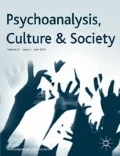
“Both new and seasoned psychotherapists wrestle with the relationship between psychological distress and inequality across race, class, gender, and sexuality. How does one address this organically in psychotherapy? What role does it play in therapeutic action? Who brings it up, the therapist or the patient?
Daniel José Gaztambide addresses these questions by offering a rigorous decolonial approach that rethinks theory and technique from the ground up, providing an accessible, evidence-informed reintroduction to psychoanalytic practice. He re-examines foundational thinkers from three traditions―Freudian, relational-interpersonal, and Lacanian―through the lens of revolutionary psychiatrist Frantz Fanon, and offers a detailed analysis of Fanon’s psychoanalytic practice.
Drawing on rich yet grounded discussions of theory and research, Gaztambide presents a clinical model that facilitates exploration of the social in the clinical space in a manner intimately related to the patient’s presenting problem. In doing so, this book demonstrates that clinicians no longer have to choose between attending to the personal, interpersonal, or sociopolitical. It is a guide to therapeutic action “on the couch,” which envisions political action “off the couch” and in the streets. Decolonizing Psychoanalytic Technique provides a comprehensive, practice-oriented and compelling guide for students, practitioners, and scholars of critical, multicultural and decolonial approaches to psychotherapy.”
“This masterfully written and accessible volume is a must-read for all committed to social justice in psychotherapy and psychoanalysis.”
—Pratyusha Tummala-Narra
“In a brilliant analysis, Gaztambide illuminates through a decolonial lens early psychoanalysis’ liberation roots. I highly recommend this excellent book!”
—Lillian Comas-Díaz
“This is a remarkable, groundbreaking text, an invaluable resource to beginning and experienced therapists alike. You have to read this book – it really is that good.”
—Leswin Laubscher
“Gaztambide’s fascinating book turns psychoanalysis inside out to unleash its emancipatory potential for today and the future.”
—Patricia Gherovici
“This timely book… is an essential step in healing as we maintain what is essential about psychoanalysis…”
—Dionne R. Powell
“There is now a definitive text to recommend to students and practitioners that covers a spectrum of psychoanalytic approaches to decolonization within one Fanon-centered volume. This is that volume.”
—Derek Hook



Leave a comment